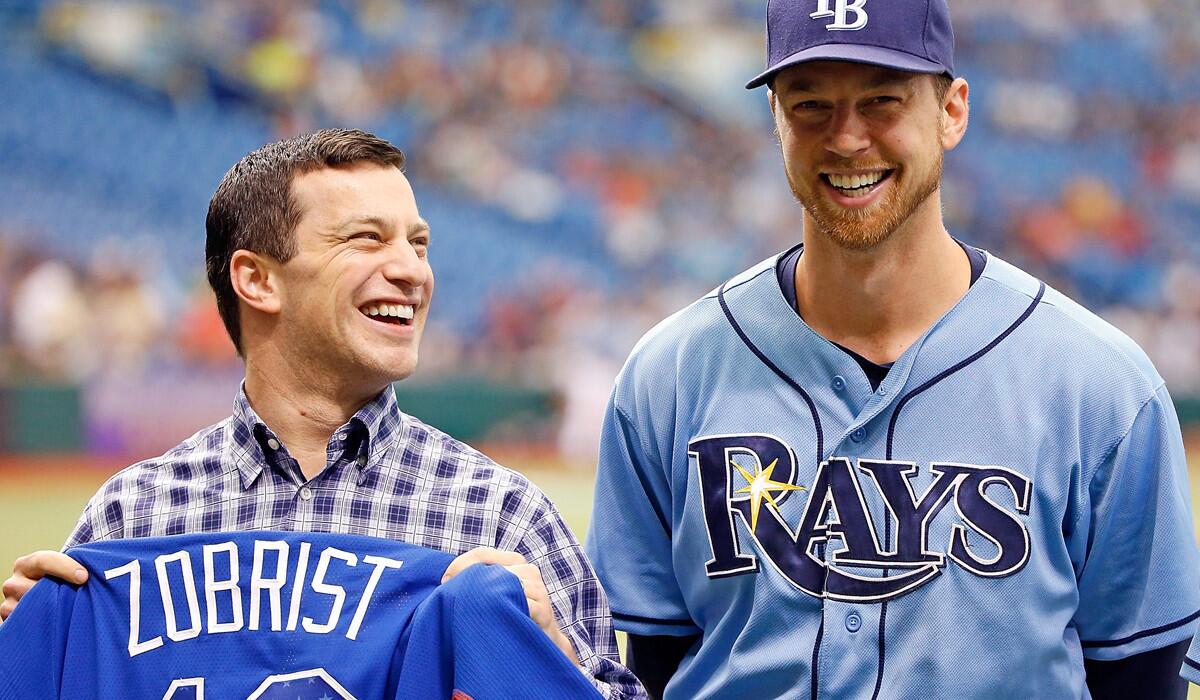Andrew Friedman will have a different business model with the Dodgers

- Share via
Evan Longoria was in the major leagues for less than a week when Andrew Friedman signed him to a contract guaranteed for $17.5 million. In addition to saving the Tampa Bay Rays millions of dollars in the arbitration process, Friedman’s foresight has allowed the small-market club to retain its franchise player to this day.
How will this type of thinking be applied to the Dodgers, now that Friedman is their president of baseball operations?
It probably won’t.
Because of their considerable financial resources, the Dodgers can be competitive without implementing many of the of cost-cutting measures that made Friedman a highly regarded general manager with the Rays.
The Dodgers’ payroll was $240 million this year. The Rays’ was $80 million.
If, say, the Dodgers determine they have a prospect of Longoria’s caliber, they can wait for a few seasons, if not longer, before deciding whether to offer him a long-term contract.
The difference between the financial situations of the Dodgers and Rays is such that multiple baseball insiders said Friedman has essentially changed careers. One person who has worked with Friedman likened the switch to a driver moving from NASCAR to open-wheel racing.
In Tampa Bay, Friedman was constantly importing young talent by trading established players who were close to becoming free agents.
Aubrey Huff was traded to the Houston Astros in 2006 in exchange for a then-unknown Ben Zobrist.
When Matt Garza was sent to the Chicago Cubs in 2011, the Rays received a five-player package in return that included right-hander Chris Archer.
Two years later, James Shields and Wade Davis were traded to the Kansas City Royals for four players, including 2013 American League rookie of the year Wil Myers.
David Price was moved by the Rays at the nonwaiver trade deadline this year. They received three players in a three-team deal that included the Detroit Tigers and Seattle Mariners.
Compare that to the Dodgers.
Last off-season, Clayton Kershaw was a season away from reaching free agency. The Dodgers signed him to a seven-year, $215-million contract.
Something else to consider: Friedman is expected to make completely different kinds of deals with the Dodgers.
Rather than selling highly attractive players in the prime of their careers, one of Friedman’s primary tasks this off-season will be to unload highly paid players in decline.
To clear space in their overcrowded outfield, the Dodgers would like to trade Andre Ethier, who is owed $56 million and batted only .249 this year. Another option would be to move Carl Crawford, who batted .300 but was limited to 105 games because of health problems. Crawford is owed $62.25 million.
If Friedman wants to trade Yasiel Puig, ownership probably won’t let him. Alongside Kershaw, Puig is the Dodgers’ most marketable player. That wasn’t a consideration in Tampa Bay, but it certainly is in L.A.
As the head of a team with a demanding fan base, Friedman also figures to have to venture into the free-agent market for key players, something he rarely did with the Rays. Some of Friedman’s worst moves were in free agency. He signed Pat Burrell to a two-year, $16-million contract after the Rays’ unexpected run to the World Series in 2008. Last off-season, he signed reliever Grant Balfour to a two-year, $13-million deal.
This doesn’t mean Friedman won’t be an asset to the Dodgers.
While the merits of the Shields and Price deals still can’t be judged — the careers of the players received in exchange will determine that — Friedman has generally received decent returns in his high-profile trades.
Not every general manager can say the same.
The Philadelphia Phillies received nothing of value when they sent Cliff Lee to the Seattle Mariners after the 2009 season. The Arizona Diamondbacks landed an underwhelming bounty for Justin Upton in 2013.
That penchant for extracting quality prospects from other teams, as well as finding serviceable players at low prices, indicates Friedman will excel in finding the right players to complement the Dodgers’ established stars.
Perhaps the Dodgers will be smarter under Friedman. They could be less wasteful. But if change comes, it will likely be gradual.
More to Read
Are you a true-blue fan?
Get our Dodgers Dugout newsletter for insights, news and much more.
You may occasionally receive promotional content from the Los Angeles Times.











